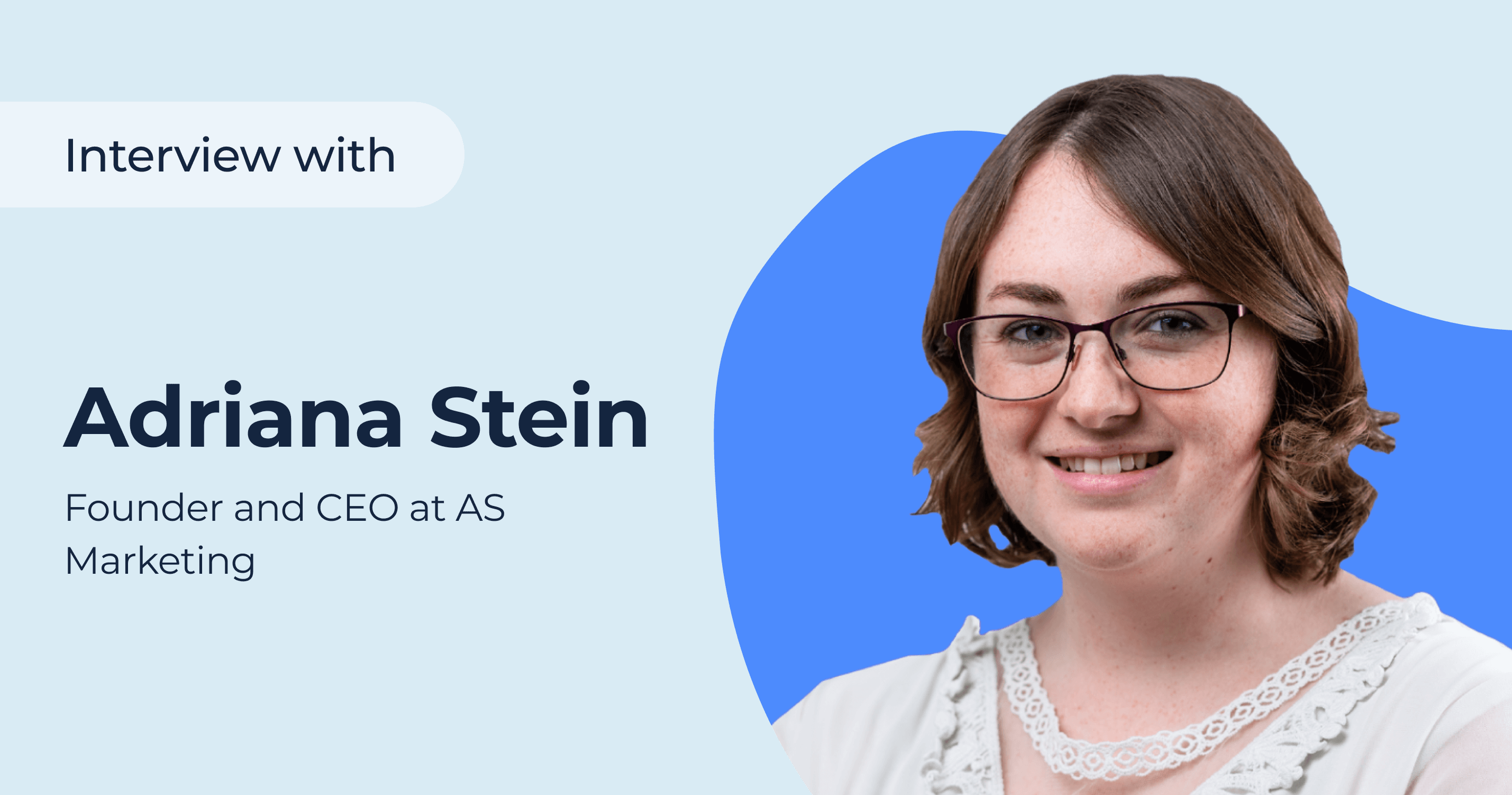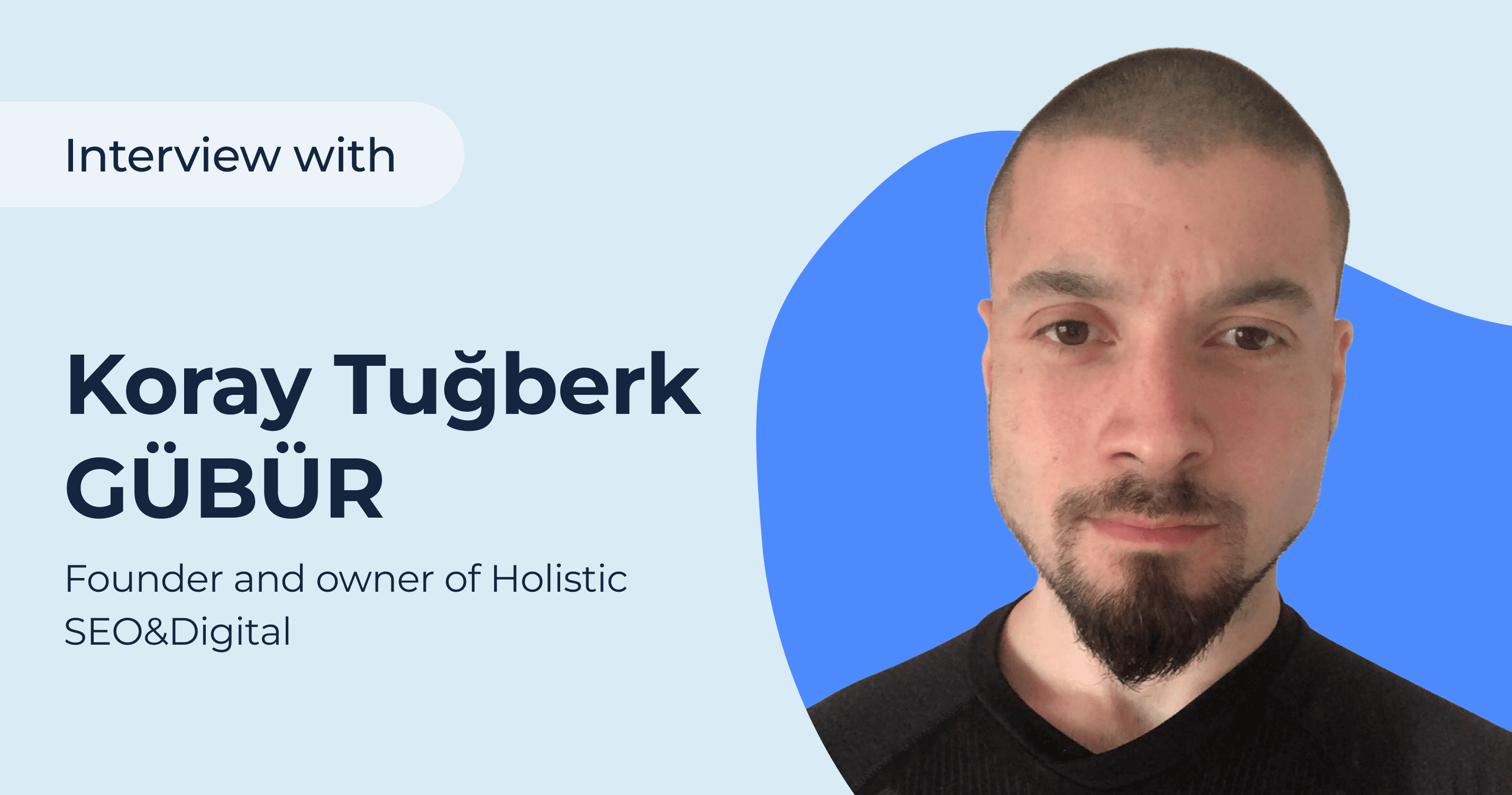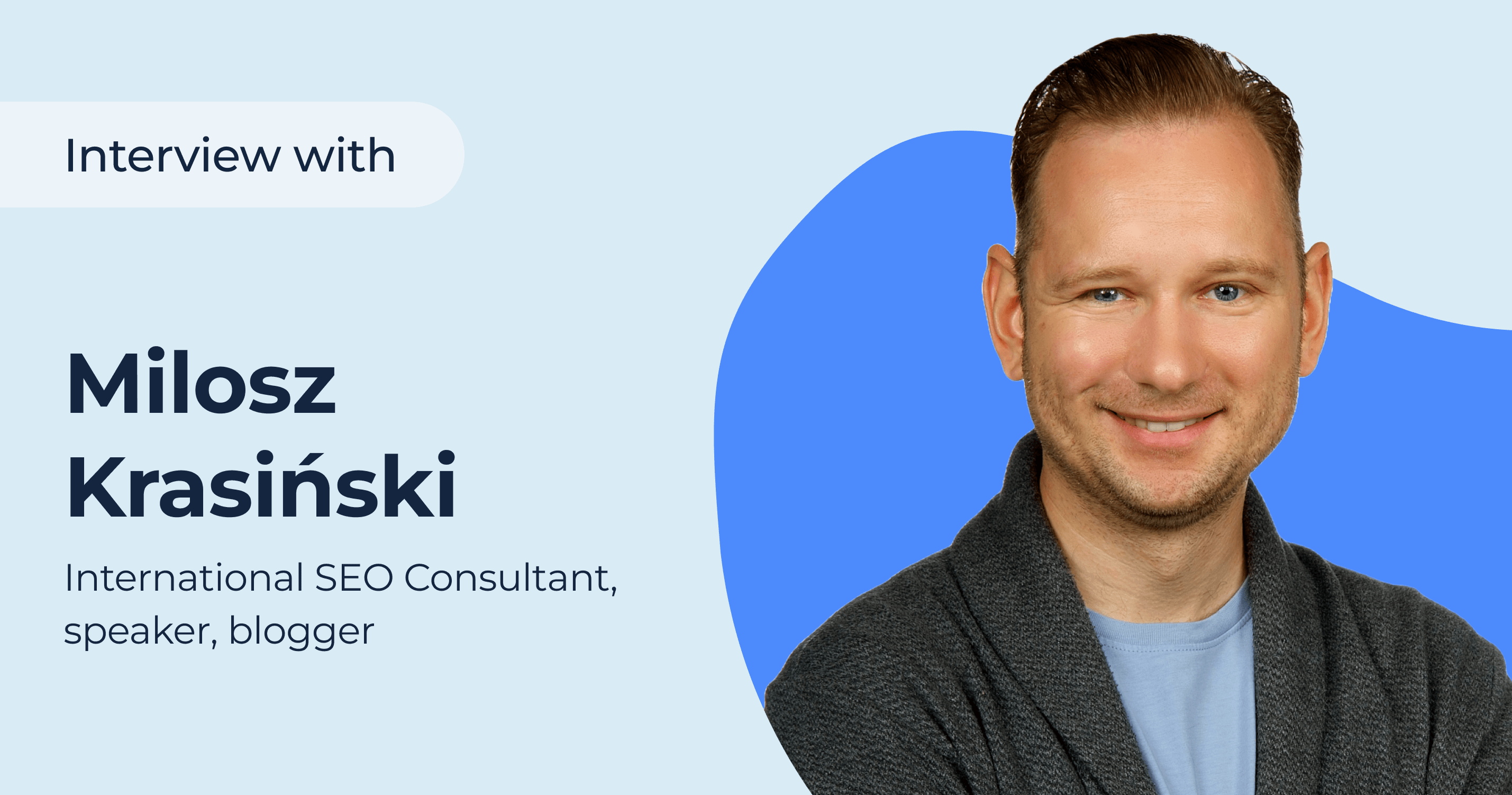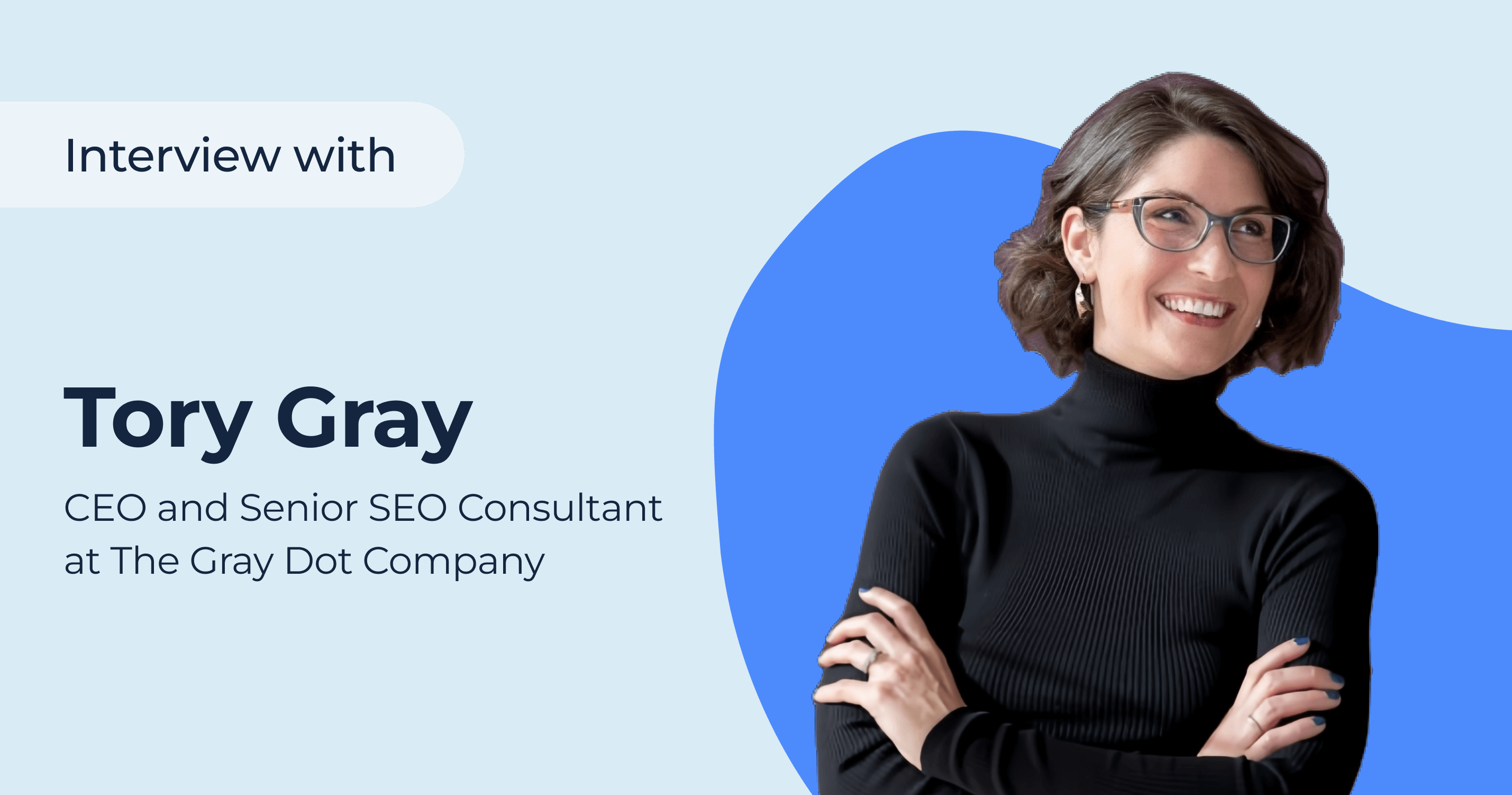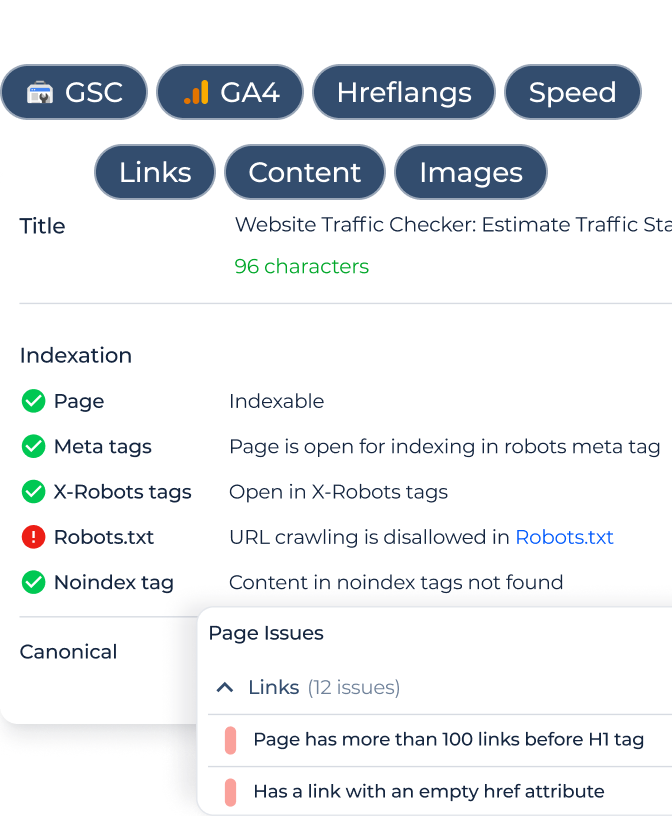Adriana Stein is the founder and CEO at AS Marketing, an agency that specializes in creating holistic online marketing strategies for B2B and B2C companies around the world. Adriana and her multilingual and multicultural team specialize in creating strategies that incorporate various techniques like native-speaker level SEO, LinkedIn content marketing, and marketing automation. By acting as strategic partners to CMOs and senior marketers, they help businesses expand into new markets, increase sales, and sustainably grow their business. To know more about Adriana, follow her LinkedIn page.
1. How many years of experience in digital marketing do you have?
I’ve been working in the digital marketing industry for six years.
2. What type of digital marketing do you have the strongest skills in?
From starting my career in freelance writing to heading a team of 20+ digital marketing specialists, I’ve developed many skills necessary in this industry. I believe in developing a T-shaped marketing expertise – that is, specializing and becoming an expert in one or two niches while learning and keeping updated about the different marketing disciplines.
My strongest skills currently reside in my capacity to lead and manage a team of multicultural digital marketing experts with various specializations.
3. How did you get into SEO?
After falling in love with Hamburg, Germany, I relocated from the US and decided to launch a career in digital marketing. I began working as a freelance content writer and translator through a platform called Ebay Kleinanzeigen. I gained the opportunity to work with a really talented German marketing manager who taught me a lot about differences in corporate culture and communication.
SEO strategies are essential to digital marketing, so they were naturally included in my learning process. Eventually, I began connecting with people through Facebook groups to leverage my skill set and offer digital marketing services. I’ve since built a personal brand on LinkedIn, which I leveraged to establish and scale an agency that develops holistic online marketing strategies to help businesses grow.
4. What projects have you launched recently that you are proud of?
Since early 2021, we’ve worked with an AI SaaS company on various marketing projects with sustained success. I’m incredibly proud of how our team has helped this company, especially their CMO, prioritize their marketing opportunities, fully understand their buyer personas and customer journeys, strengthen their brand positioning, and piece together multiple marketing plans into a holistic growth strategy.
I feel that it reflects how much our agency has grown and how our strategy of actively searching for team members with diverse backgrounds and skillsets has prepared us for tackling complex projects.
5. You are one of the brightest female representatives of the SEO industry. What is your recommendation to all the girls thinking of starting a career in SEO?
Starting a new career in any industry can be overwhelming, especially in today’s day and age. While there are thousands of resources freely available, the challenge is to sift through those and find the pearls you need to move forward. Trust your gut and use the skills and knowledge you already have. Keep doing what you’re good at, and always look for opportunities to stack your skills.
I would also recommend reading about and following Areej AbuAli, the founder of Women in Tech SEO. She’s one of my role models and has made new milestones for women in the SEO world that haven’t been seen before. She’s inspiring and can help give you the confidence you need to begin your career in SEO.
6. What do you do to further your own SEO knowledge and skills?
I’m a regular podcast listener and I closely follow “State of Demand Gen” by Chris Walker. He always has a lot of new ideas regarding the digital marketing world that helps me further develop our marketing tactics. I also read marketing newsletters, books, and blogs and stay up to date with marketing trends. Keeping up with Google’s algorithm changes is essential for ongoing success.
7. What are the most important soft SEO skills?
SEO may seem like a very technical field, but after years of experience, I’ve seen that the most effective SEO strategies are those that are founded on empathy and a good understanding of your target audience.
Effective SEO also requires a basic understanding of certain entrepreneurial skills. A lot of these soft skills aren’t as easy to learn as the more tactical features, especially when it comes to the adaptability of the field. SEO algorithms are constantly evolving and that requires a dynamic approach to creating successful strategies. You need to be willing to learn and keep going, which requires discipline and self-motivation. As I like to say, you need to embrace the chaos.
8. What SEO tactics do you think are underrated?
A lot of the basic SEO strategies are the most underrated. Internal linking, website speed, and overall UX/UI design are essential for strong results but sometimes overlooked. Periodically updating old content is also important. The world is constantly evolving, so your SEO tactics should be too.
One of the most underrated SEO tactics though is blending storytelling with SEO. To build a successful marketing campaign, you need to empathize to understand why the things you publish matter to your target audience. The ability to see things from several perspectives along with storytelling produces enticing and engaging content that helps business growth take off. It’s underrated, but story-based marketing motivates and inspires while cultivating loyalty and trust.
9. What is your checklist for website migration?
- Check if migration is indeed necessary. Those are very sensitive tasks that, if done wrong, can compromise months of hard work building the SEO equity of a website. Some good reasons to do a website migration are: changing to a better server, if profound changes in website structure are needed, a change of domain, a redesign (for rebranding purposes, etc.), and moving to a new CMS or even to a new framework (from HTML to PHP, Liquid, React, etc.).
- Define a timeline with a final migration deadline. While you do that, set clear and realistic goals of how many pages you can move per time with your current resources.
- Make a backup copy of your old website (in the case of a redesign or a new website structure), so you can revert in any case. Also, save a crawl of your old website structure. In migrations, you need to plan for the worst.
- Audit the new website for SEO technical problems (internal links, crawlability, speed, etc.) and UX issues that can cause any problems when this new site goes live. Be very attentive to details.
- Make a spreadsheet relating all the old URLs with the new ones. This list is vital to track how well the search engines understand that new addresses are the old ones but migrated.
- Make changes gradually to address all fortuitous issues in time so that Google doesn’t look at your new website as a completely different website. Make a plan of which parts of the website to migrate first. Then, create batches that should vary in size depending on your resources, team, and experience with migrations.
- Ensure all the internal links are updated, so you don’t end up with broken links and lose your website structure.
- If your migration involves a lot of redirects, make sure you’re not creating redirect chains. Those chains will debilitate your website SEO equity and confuse search engines.
- Keep an eye on the data. That precaution is crucial in domain migrations since you must ensure that your last domain’s authority is successfully transferred to the new one. Benchmark and compare the data from your Google Analytics to understand any shift in traffic (whether it’s in particular pages or the whole website etc.).
- Schedule the migration during a “low season.” For instance, if you’re an eCommerce owner, don’t migrate at the end of the year – and also avoid doing it right before. Even if done 100% right, the migration may affect your traffic.
- Set up a customized 404 page, so users that fall in non-existent pages can find their way back to the website – and you won’t lose much traffic.
- Block indexation of the new site until the migration is finished. After it’s done, submit the new sitemap or request indexing for the main pages.
10. What are the key reports that an SEO specialist should pay more attention to in Google Analytics?
I think an SEO should keep an eye on all Google Analytics metrics, as it offers fantastic data for many things. With that said, I think some of them are more directly related to the work of an SEO.
The first is the acquisition report since SEO professionals are mainly in acquisition. Beyond that, it’s a good reminder for SEOs that organic isn’t the only source of traffic on the website.
Knowing the share of organic traffic and other sources can serve as a metric to understand the website’s SEO health. Typically, a website’s organic traffic ranges from 70 to 80% of all the website traffic. If it’s any different, take a closer look at your SEO strategy.
The second one is the behavior report. SEO needs to go hand in hand with User Experience optimization. That tab shows valuable data on user engagement, from site speed to the content drill down.
Finally, there are a few insights SEOs can take from the Audience and the Monetization report. In particular, SEO professionals should understand demographics and device usage to inform keyword research (for local SEO strategies) and technical adjustments in the website. The Monetization report helps SEOs understand the buyer’s journey while building their campaigns and checking how well the website performs at the bottom of the funnel.
11. What are the differences between English and German-speaking marketers within digital marketing?
The biggest difference between English and German-speaking marketers is their approach to digital marketing. And this comes down to the cultural difference between the US or UK to Germany.
For example, in English, you address your audience using “you.” In German, there’s an important distinction between the formal and informal use of you, which is “du” or “Sie.” When writing copy, brands must know how they should address their audience. If the brand is more informal, like some B2C brands, then “du” is more appropriate. If the brand is a formal B2B company, for example, a law firm, then “Sie” will likely be used. It all depends on what type of relationship and communication style a brand wants to build with its audience.
Another key difference is German-speaking marketers need to really know the localized context for words used in a specific industry or market. English terms are being used more than ever in Germany, such as “content” or even “digital marketing.” Simply translating English to German doesn’t work for German-speaking marketers, so specialist knowledge is needed to communicate with target audiences effectively.
12. In your opinion, what are the top trends for SEO in 2022?
One of the first things that come to mind is the SERP changes. Google now can show indented results from the same domain in a single SERP. That shift in SERPs will probably be on the radar of many SEO professionals as they try to seize more search engine real estate for their main queries.
By the way, I also think that Google will keep implementing changes on SERPs that will create more “zero-click” searches.
This year, I expect SEO automation to focus on many professionals in my area. Some of last year’s trending topics, such as CWV and how they’re presented to the webmaster in GSC, will still be quite hot topics in 2022.
Another trend (which is hardly a trend now) is that Google will keep rolling out updates to identify user intent behind each query better. An example is the MUM – the Multitask Unified Model – that rolled out in June of the last year. Thus, we can expect to see search results become more personalized and better predict the user intent for each query. We’ll see SEO professionals advocating a holistic approach as a direct consequence.
13. How do you make competitor analysis? Please provide a short 1-2-3 steps guide.
Competitor analysis it’s about informing what kind of SEO efforts our search competition is doing that we’re not. It’s a way to understand how we can improve our approach or enrich our campaign with new strategies, keywords, topics, among others.
To breakdown in simple steps:
- Select your competitors. The first thing is to choose your competitors with great care and attention. They need to be competing with you for the same SERPs – it may be a blog or a business website, it doesn’t matter. As long as you’re going for the same search behavior, they’re your search competition.
- With that said, it’s also important to note that you’re not trying to compete in every niche they’re acting in. Maybe a website is more significant than yours, so going after all its keywords doesn’t make sense.
- Analyze your keyword and backlink gap. You need to look into data to understand what your competitor is doing. The most important ones are the keyword gap and the backlink gap.
- This is standard procedure in SEO: create a spreadsheet that shows all keyword and referring domains the other websites are getting that you’re not. This should inform your content and link-building strategy.
- Monitor and compare organic growth and performance. Don’t stop at the gap you have now – you need to keep monitoring your competitors’ velocity getting new links and new keywords. Are their rankings improving faster than yours? Is their organic traffic growing faster? Continuous monitoring and updates to your strategy steer your SEO efforts in the right direction.
14. What is your approach to developing a strong SEO and content marketing strategy?
I think it’s important to remember that each business is unique, so our marketing strategy should be too. To understand how to develop each business’ strategy, you need to take the time to understand their goals and values. This allows you to cultivate a healthy partnership and act as an integral part of their team.
From here, you need to gain a strong understanding of the audience you’re targeting. Now more than ever, marketing relies on empathy and flexibility, which are essential when creating a client’s marketing strategy and roadmap. Empathy marketing shows that you care and that businesses exist to improve their customers’ lives. Combining these features with technical SEO strategies, on- and off-page optimization, and creating captivating content is how we develop results-driven holistic marketing strategies.
15. SEO is such a controversial thing. Every SEO specialist rates its success differently. What is your way to rate SEO success? What metrics do you look at?
It’s impossible to have one set of SEO success metrics because every project is different. For example, for a new domain, my KPIs might be growing the domain authority or the number of ranking keywords. While for a more established domain, the metrics to look out for might be the conversion or engagement rates. However, it all depends on what a brand is after.
I think it’s essential that SEO specialists don’t just track their success by vanity metrics. For example, there’s no point in having a high average keyword rank or page views if that traffic isn’t the right audience for a particular brand.
SEO success for me is starting at the drawing board and ensuring we’re targeting the right buyer personas. Then, making sure we’ve got a thorough keyword map to guide a well-thought-out content strategy. Success is also seeing highly qualified leads enter the sales funnel thanks to a series of super-targeted long-tail keywords.
These long-tail keywords might not get high traffic, but they’re a perfect match between a user’s search intent and what a brand has to offer. Because we can’t forget, at the end of the day, SEO is a marketing strategy with the ultimate aim of growing a brand and its sales.
16. How can start-ups and early-stage businesses use SEO effectively to drive traffic to their sites?
The thing about startups is that what they’re offering is often entirely new, without many parallels in the market. In that case, maybe there’s no search behavior (keywords, etc.) that directly matches their product or service. In that case, the SEO campaign should focus on finding the proper search behavior to target.
Even if startups offer a very innovative service, they must be competing with something else. Thus, startups can profit from SEO by targeting the search behavior directed to solve problems. Take Canva, for instance. They built a very successful SEO strategy focusing on people’s pain points when using more complex editing software.
Another good example would be fintech and digital banks. At one point in time, there wasn’t a search demand for “best digital bank in the UK,” for instance, but there were always doubts and pain points among the users of the traditional banking system.
As for early-stage business, a lot of that also applies. It’s essential to find which novelty your brand brings to the market and sets you apart from your competition. This way, you can start ranking on niche keywords and build your online presence to the top of SERPs from there.
17. What are your tips for blog optimization?
First of all, focus on creating the best content possible. This is the main asset that attracts readers to your site, and it’s ultimately what Google wants to show on SERPs. Focus on creating unique and original content.
Next, write with the user in mind and optimize your articles for the keywords that match the search behavior you’re targeting. Of course, don’t forget semantical and framing keywords and other terms to support your content.
After that, consider other elements, like maintaining a good site hierarchy and structure. Choose internal links with care so you can point out to Google and other search mechanisms the most relevant topic of each page. It’s important to apply best practices such as implementing a pillar-cluster structure. Also, make sure no page is more than three clicks away from the homepage to be easily discovered and don’t become orphan pages.
18. What do you prefer the most: client SEO, own projects, consulting, something else?
I enjoy all of the aspects involved in developing marketing strategies, but I think creating long-lasting relationships with clients is one of my favorite. Serving as a partner to fill the gaps in a business’ resources is rewarding work. It allows us to work together with internal teams to increase our client’s revenue and help them grow their business. Consulting with clients is one of the things that I love about marketing. It has taught me that developing relationships with clear communication and staying true to your word go a long way in the business world.
19. Have you ever used black hat and grey hat SEO tactics? What do you think about them?
No, using black and grey hat SEO tactics goes against my business ethics and long-term strategies. Marketing should be about connecting with your audience on an empathetic level. The goal is to build a reader’s trust and prove that your business is reliable and an expert in what they do.
Using black hat and grey hat SEO tactics is a form of manipulation that does the exact opposite. It tries to trick audiences into believing a company is reputable because they rank highly on search engines.
Luckily, Google and other major search engines have cracked down on issuing harsh penalties for these tactics. I think more people realize that, along with being unethical, it’s simply not worth the risk. My team takes a collaborative approach to white hat SEO tactics that allow scalable, sustainable growth.
20. Have you ever run Google Ads campaigns? How do you combine Google Ads campaigns and SEO?
Yes, I have. Despite both being parts of Search Engine Marketing, they’re quite different in execution and strategy. However, they do benefit each other. As we know, SEO campaigns take time to produce results. Paid ads give your website quick results and an easy to predict ROI.
Let’s say you want to generate leads for a specific keyword. You can’t wait three months to start ranking for that query, so Ads can come in hand to guide qualified leads to your website and make sure people are seeing your content. As more people visit your website, maybe they can return or refer it to other consumers. They can share it on social media. Ads help us engage users this way; it’s a perfect complement for an SEO campaign in the early stages.
Another benefit for Ads is the ease of being featured in SERPs. One of the benefits of buying a place at the top of SERPs is not the click itself but showing the user, you’re also a player in that market. It helps you grow your online presence much faster. Ads can help websites rank in new niches in a very similar way. If a website wants to target a new set of search behavior, that same strategy might work.
21. Does your university degree help to succeed in SEO and digital marketing?
Absolutely. I have my Bachelor of Arts in Anthropology and English. My Anthropology studies motivated me to travel and curate my unique skill set that spans the European and North American markets. My English degree helped me develop the ability to create compelling copy, appeal to my audience, and strengthen my critical thinking skills.
22. Are there specific advantages, disadvantages to being a woman business owner?
The world has gotten more progressive, so it’s definitely easier than it once was to succeed as a woman business owner. With that being said, you need to be good at what you do and produce better results than people expect. This has motivated me to work hard and always overdeliver with my clients. I never want someone to assume that the work my team produced was subpar because AS Marketing is a woman-owned business. This ability to exceed expectations has been a considerable advantage, as it allows me to develop a strong reputation in the SEO and marketing world.
23. Can you share your professional and business plans for the next 2-3 years?
In 2-3 years, our focus will be on strengthening brand awareness. I want our agency to be more proactive in that we stand for something in particular as a brand. Becoming an industry leader in B2B marketing focusing on human-to-human interaction is really important for me as we continue to develop our culture.
In terms of concrete projects, my goals include launching a podcast, creating a marketing masterclass, and developing an agency culture that focuses on continuous upskilling and mentorship.
It’s a work in progress, but we’re also currently developing a marketing playbook that helps B2B businesses personalize their customer journey and sales funnel content in a way that B2C marketing has found success. While B2B tends to be more corporate fueled, it’s becoming increasingly personal as businesses realize that they’re stronger together. This is a project we’re really excited about as B2B clients seek personalization through customer journey maps and storytelling instead of traditional sales funnels. Our goal is to help B2B clients align sales with marketing and embrace the customer-centric future. So, be on the lookout for the release date of our new playbook later this year.
24. How do you see the future of SEO (in 5 years)?
Five years ago, we were already discussing many of the things we’re currently talking about this year in SEO: user intent, quality content, semantical relation between topics, site speed, rich snippets, and others. Those discussions will remain as part of the ground philosophy search mechanisms are based on.
However, I see some new aspects that can gain shape in the near future. In 5 years, we may see Google losing a bit of its market share. I’m not talking about a massive shift in power, just the emergence of other search engines such as Brave, DuckDuckGo, or even a player we haven’t discovered yet.
I also see voice search becoming more and more relevant as more people acquire smart speakers and houses. The advances on 5G and the “Internet of Things” will also contribute to the rise of voice search and more interactive ways of searching the internet.
And speaking on voice search, it’s inevitable that AI will be much more sophisticated five years from now. Google will understand search intent like never before, which will only strengthen the “holistic SEO approach” theory. Maybe Google’s AI will be sophisticated enough to understand and index images across the internet. This would mean a new chapter on Image SEO.
25. The best piece of advice I have ever been given is…
We individually define what success means for us, not social media, not our colleagues or clients. Success doesn’t need to focus solely on career achievements, it can include our familial relationships, hobbies, or anything else we deem important for being happy. When put this way, we start to realize that we’re already more successful than we think.
